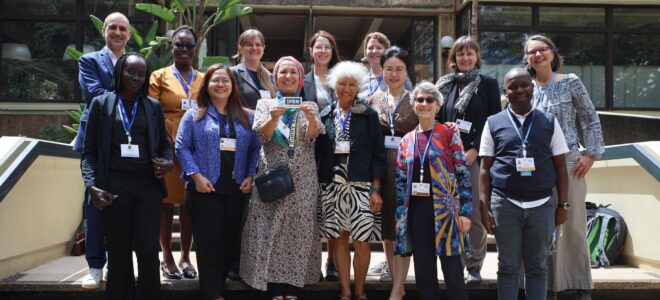The second session of the ad hoc Open-Ended Working Group (OEWG-2) on the Science-Policy Panel on Chemicals, Waste and Pollution Prevention is taking place in Nairobi, Kenya, from December 11 to December 15, 2023. Three IPCP Board Members are in attendance and are providing their daily summaries.
Once again, the day opened with a meeting of the Major Groups where most representatives supported an intervention regarding more comprehensive activities for capacity building, one of the five functions of the panel. In the regional meeting of the Group of Latin American and Caribbean Countries (GRULAC), the IPCP Chair, Martin Scheringer, was invited to deliver the presentation on conflict of interest that he gave in the Major Groups meeting on Sunday, where it was well received.
Then the OEWG plenary session began. The session began by returning to an issue of procedure that arose on Monday – the election of two delegates from the region of the Eastern European States as members of the OEWG Bureau (agenda item 2 of OEWG-2). At the OEWG-1.2 session in Bangkok in January 2023, the Eastern European Group was unable to elect two representative delegates. Meetings before the opening of OEWG-2 in Nairobi of the Eastern European Group again failed to elect the two delegates. Under these conditions, the rules of procedure allowed for the election of these delegates in a closed-ballot vote of all delegates to the plenary. However, this closed ballot vote was significantly delayed by hours Russia’s repeated interventions regarding questions of quorum and the checking of delegates’ accreditation documents. These complications interrupted the work flow of the day substantially. Ultimately, Romania and Ukraine were voted in through secret ballot to represent the Eastern European Group. Several countries spoke to support the outcome of this vote. A palpable air of relief emanated from many delegates after this day-long drama.
After a short break for dinner, the contact groups (i) and (ii) resumed their work. Contact group (i) first went through elements to include in the operating principles of the panel. The discussion in this part of the session was about including specifically in the operating principles other principles such as “prevention” and worker health and safety. The goal was to condense the long list of suggested additional operating principles from the contact group’s first session yesterday. The purpose of the discussion was still for delegates to express their preferences and views, but not yet to draft specific text for a meeting document.
Next, the group discussed the Conflict-of-Interest policy. In this part of the session, the group went through the text of the document INF/10/Add.1 paragraph by paragraph and line by line. The country delegates modified, streamlined, and amended the text at several points. When the procedure of disclosing potential COIs was discussed, the IPCP Chair, Martin Scheringer, made an intervention in which he proposed that in the COI Disclosure Form financial and non-financial interests should be covered in two separate sections because financial and non-financial interests are very different in nature and in the way they may cause COIs. This proposal was well received. One country inserted language that would allow for non-disclosure of COI based on military, national security, intellectual property, but most concerning, confidentiality related to “commercial, government, or industrial information”. This inclusion, if adopted, could allow for substantial non-disclosure and could render the COI provisions ineffective. Another suggestion was made to strengthen the COI provisions by including a more explicit mechanism to act on cases where COI is identified.
Contact group (ii) presented a tentative figure illustrating a basic structure of the panel to facilitate discussions and interventions. The member states worked very effectively in edits for the descriptions of the plenary (or governing council) and the bureau of the panel. Interventions were made that suggested member states nominate individuals with Science and Policy skill sets. There were recommendations that member states would propose topics for the panel with special emphasis on developing countries and that the panel should accept suggestions from stakeholders as well.
Overall, it was a long and exhausting day, but it was good to see that substantial progress could be made in both contact groups in spite of the many challenges.
—
Longer daily reports prepared by the International Institute for Sustainable Development, Earth Negotiations Bulletin are available at: https://enb.iisd.org/oewg2-science-policy-panel-contribute-sound-management-chemicals-waste-prevent-pollution
Photo by IISD/ENB | Anastasia Rodopoulou
